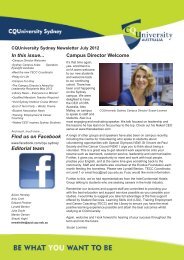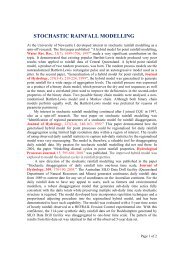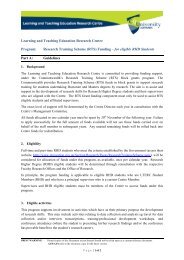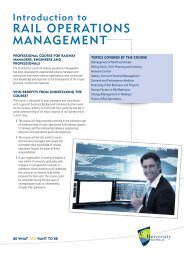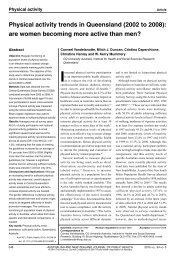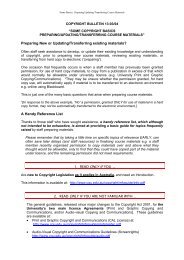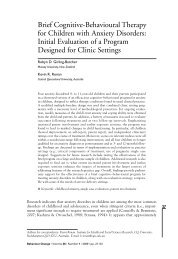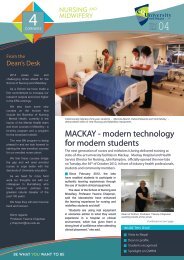View mobile device version - Central Queensland University
View mobile device version - Central Queensland University
View mobile device version - Central Queensland University
Create successful ePaper yourself
Turn your PDF publications into a flip-book with our unique Google optimized e-Paper software.
30<br />
Be: Parenting<br />
Homework<br />
horrors<br />
Dr Ali Black is a senior lecturer in the<br />
School of Education at CQ<strong>University</strong><br />
Gladstone. She is also a former early<br />
childhood teacher and a parent.<br />
While families can sometimes come to loggerheads over the<br />
homework table, there is still value to be found in meaningful<br />
out-of-school learning, writes Ali Black<br />
Homework is one of those activities that<br />
can be a source of dread for parents as well<br />
as children. It is also an activity that many<br />
parents expect and want as proof of good<br />
teaching and learning. However, how many of us have<br />
good experiences with homework? I have heard too<br />
many stories of people stressing for hours at the kitchen<br />
table, trying to make sense of homework (and that’s<br />
just the parents!). Recently, my 11-year-old was in tears<br />
trying to make sense of a task sheet his teacher had<br />
given him. It was work that was unfamiliar to him; he<br />
had left it to the 11th hour to begin, discovered there was<br />
a lot to do, and he was overwhelmed. After reading<br />
the homework and finding out the due date – the next<br />
morning – I was overwhelmed too.<br />
We all have busy lives, children too. My view is<br />
that we need to value childhood. It happens once.<br />
Family interactions are also precious. A balanced view<br />
is essential. If homework is repeatedly a time of stress<br />
and struggle then it requires a rethink. We want our<br />
kids to feel good about themselves and their learning,<br />
and sometimes homework experiences challenge<br />
those good feelings. Homework, especially at primary<br />
school, doesn’t necessarily support higher achievement<br />
levels. If there is too much, or it is too hard, and it<br />
takes too long, it can get to be overwhelming and can<br />
squeeze out those healthy childhood experiences such<br />
as playtime, relaxation, hobbies and just hanging out<br />
together.<br />
However, homework works well when it is<br />
meaningful and builds on what children are learning<br />
in class and helps them practise and consolidate<br />
knowledge and skills. It can also support the<br />
development of planning, research and organisational<br />
skills, and strategies for working to deadlines and<br />
timelines. It also offers a space for parents to see what<br />
children are learning and what they know, to discuss<br />
ideas and concepts and to work on projects together.<br />
Homework isn’t always easy, so teachers need<br />
to ensure they offer strategies for children to use,<br />
offering steps and explanations for how tasks might be<br />
approached, or what needs to be done. Parents have a<br />
role too. We can support the development of optimistic<br />
dispositions and encourage our children as they work<br />
through ideas and challenges.<br />
Learning can be hard, and often is hard. We can be<br />
a positive voice and help our children think positively<br />
about themselves as learners, about problem solving<br />
and about academic work. We can also find out more<br />
about homework: how long it should take, what<br />
concepts or skills the child should be focusing on, and<br />
whether homework could build on children’s interests<br />
or include some fun elements – like learning fractions<br />
through a cooking activity or dividing up a pizza.<br />
We can help our kids by identifying the best time<br />
to do homework. Maybe that time is straight after<br />
school, or it could be before school, or maybe there is<br />
a need to play and relax first. We can help by creating<br />
the right environment – a study space with good light,<br />
enough space, the right resources (computer, paper,<br />
pens, calculator) and few distractions. We can help by<br />
focusing on our children’s efforts and acknowledging<br />
their good strategies and ideas. <br />
Share your homework concerns with<br />
the Friends of Be Magazine group on<br />
Facebook.<br />
HOMEWORK<br />
TIPS<br />
Find out the<br />
teacher’s view<br />
on homework<br />
If homework<br />
equals tears and<br />
stress then talk<br />
to the teacher<br />
about a solution<br />
Be a positive<br />
voice and<br />
source of<br />
encouragement<br />
Take an interest<br />
in your child’s<br />
learning and<br />
what they do for<br />
homework<br />
Find the<br />
best time for<br />
homework<br />
Create a good<br />
study space at<br />
home<br />
Break tasks<br />
down into<br />
manageable bits<br />
ISSUE 13



